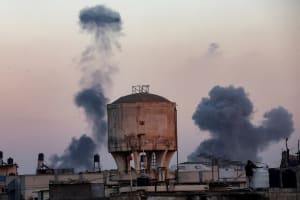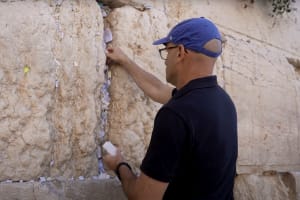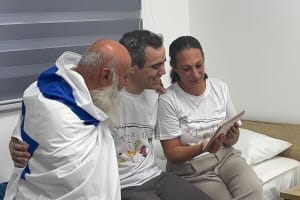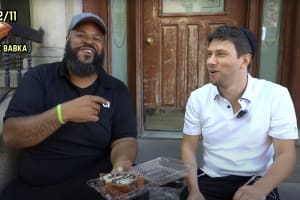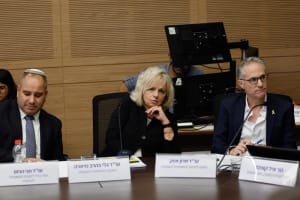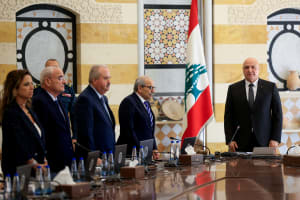Gaza war ‘absolutely’ wasn’t genocide – but Israel has to improve Palestinian lives for ‘integration’ in the region, say Witkoff & Kushner
US envoys say they connected with Hamas leader al-Hayya over sons' deaths

After bringing about a ceasefire that freed twenty living Israeli hostages and the bodies of twelve killed hostages so far, U.S. envoys Steve Witkoff and Jared Kushner sat down with CBS News’s 60 Minutes for a wide-ranging discussion of the deal and its circumstances.
The interview was filmed before Hamas terrorists attacked Israeli soldiers on Sunday, killing two and wounding three others.
In addition to these attacks, the biggest problem threatening the survival of the ceasefire is Hamas’ reluctance to hand over all the hostage bodies in its possession.
There are 16 bodies still being held in Gaza, and Israel has alleged that the terror group either directly holds or knows the location of several others, while acknowledging that some bodies may inaccessible or buried under rubble.
Kushner, however, told CBS that he believes Hamas is acting “in good faith” and trying to meet its commitments.
“As far as we've seen from what's being conveyed to us from the mediators, they are so far,” he said. “That could break down at any minute, but right now – we have seen them looking to honor their agreement.”
Regarding Hamas’ bloody crackdown on internal opponents, including summary and public executions, Kushner commented, “Hamas right now is doing exactly what you would expect a terrorist organization to do, which is to try to reconstitute and take back their positions.”
“The success or failure of [the ceasefire] will be if Israel and this international mechanism is able to create a viable alternative. If they are successful, Hamas will fail, and Gaza will not be a threat to Israel in the future,” he added, referring to the international committee that is supposed to take over governance of the enclave from Hamas.
“The biggest message that we've tried to convey to the Israeli leadership now is that, now that the war is over if you want to integrate Israel with the broader Middle East, you have to find a way to help the Palestinian people thrive and do better,” Kushner said.
Asked whether he thought the agreement would survive, he quipped, “First of all, it's the Middle East, so everyone complains about everything.”
The U.S., he said, is now “focused on creating a situation for joint security and economic opportunity for Israelis and Palestinians so that they can live side by side in a durable way.”
Asked whether that would constitute a Palestinian state, he replied, “What you end up calling it over time, we’ll allow the Palestinians to determine that themselves.”
The two envoys also recounted visiting Gaza shortly after the agreement was struck. “It looked almost like a nuclear bomb had been set off in that area,” Kushner said.
“And then you see these people moving back, and I asked the IDF, ‘Where are they going?’ Like, I'm looking around. These are all ruins. And they said, ‘Well, they're going back to the areas where their destroyed home was, onto their plot, and they're gonna pitch a tent.’ And it's very sad, because you think to yourself, they really have nowhere else to go.”
CBS’s Leslie Stahl then asked, “Would you say now, having been there, that it was genocide?”
“No. No,” said Kushner, and Witkoff added, “Absolutely not. No, no, there was a war being fought.”
The two envoys also talked about their crucial role in bringing about the agreement, even personally negotiating and bonding with senior Hamas leaders to assure them the U.S. would prevent Israel from returning to fighting after the hostages’ release.
“We just kept on thinking to ourselves, ‘This finish line? This finish line is about saving lives’,” Witkoff said while explaining their motivation to get involved in the talks.
“We wanted the hostages to come out. We wanted a real ceasefire that both sides – would respect,” said Kushner.
“We needed a way to bring humanitarian aid into the people. And then we had to write all these complex words to deal with the 50 years of stupid word games that everyone in that region is so used to playing.”
Noting they felt “a little bit betrayed” by Israel’s strike in Doha, Qatar, Witkoff added that Netanyahu’s apology call to the Qatari emir was crucial in enabling the ceasefire agreement.
“The apology needed to happen. It just did. We were not moving forward without that apology.”
Witkoff stressed that President Trump’s decision to approve their face-to-face meeting with Khalil al-Hayya, who is currently among the most senior Hamas leaders, was “courageous.”
“We expressed our condolences to him for the loss of his son,” said Witkoff. “He mentioned it. And I told him that I had lost a son, and that we were both members of a really bad club, parents who have buried children.”
While Witkoff’s son Andrew died of an opioid overdose in 2011, al-Hayya’s son Himam was killed in the Israeli airstrike on Hamas’ Doha headquarters last month.
Kushner described al-Hayya as a “hardened” person who has “been through two years of war.”
“They green-lit an assault that raped and murdered and did some of the most barbaric things,” he said. “They’ve been holding hostages while Gaza’s been bombed. And they’ve withstood all the suffering… But when Steve and him [sic] spoke about their sons, it turned from a negotiation with a terrorist group to seeing two human beings kind of showing a vulnerability with each other.”

The All Israel News Staff is a team of journalists in Israel.
You might also like to read this:


